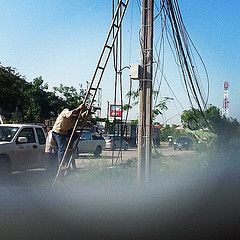Paul Garrigan's Blog, page 49
May 16, 2012
Weather Forces Us to Leave Our Home in Minburi Again
Readers of my blog may remember how back in October we were forced to leave our home as a result of the Bangkok floods. That saga lasted over a month, and I felt at my wits end near the end of it. I normally enjoying staying in hotels, but this is not so much fun when you have no choice in the matter. The flood season is still a few months away so I wasn’t expecting that we would need to give up our home again so soon. Yet here we are once again staying in a hotel as a result of bad weather.
After the Storm No Electricity
It is fairly common for the electricity to cut out here during the middle of a bad weather. On Monday afternoon we had a particularly bad storm so I wasn’t surprised when the power began playing up. This loss of electricity usually only lasts a few minutes so it isn’t too big a deal. I have lost work on the computer this way, but I’m now more careful when the weather turns bad. In 12 years I only remember a couple of occasions when the electricity has been off for longer than an hour.
This storm was a bad one, but it only lasted about 50 minutes. I sat at my computer just waiting for the power to come back on – full of optimism. Luckily I’d charged my iPad so I had this to keep me occupied. My office began to get uncomfortably hot so when there was no sign of the electricity after an hour I called it a day and joined the family downstairs. We decided to brave the mosquitoes and sit out in the garden. It was cooler out there. It actually felt nice to sit watching the sunset together. I would love to say that this lack of electricity meant we were once again enjoying a more natural way of life but that would be an exaggeration. My wife and I were both busy on our iPads, and my son was absorbed in his Leapfrog game tablet.
After about three hours we had almost drained the batteries for our various gadgets. The electricity had still not come back. My wife decided to investigate. It turned out that all the electrical poles on the main road had been knocked down by the high winds. Thanon Khum Glao looked like a war zone and two cars had been hit by flying concrete poles – luckily nobody was seriously injured. The workmen were already working on repairs, but it would be a huge job.
The Hell of No Electricity in Thailand
The lack of electricity precipitated a truly awful night. None of us were able to get much sleep. The bedroom felt like a furnace without the air conditioning and fan – we use both at the moment. My wife opened all the windows to let in a breeze but it also meant that the room became invaded with mosquitoes. I then had the choice of sweating under a sheet or being eating alive by insects. My wife spent the night trying to fan our son with a magazine – this meant that at least he was able to get a bit of sleep. It was a long night for the rest of us.
Yesterday morning I went to check on the repairs and it didn’t look as if there had been much progress. The repairmen couldn’t say if we would have the electricity back by that evening – they looked doubtful. There was no way that I could go through another night of torture so we decided to abandon ship again. We are now staying in a hotel in Pattaya where I have the air conditioning on full blast. I will never complain about being cold again.

Fixing the Electricity in Minburi
May 12, 2012
Why I Do Not Hate Alcoholics Anonymous – Video
In this episode I discuss my reasons for not hating Alcoholics Anonymous
This video is based on my post Why All the Hatred for Alcoholics Anonymous
May 8, 2012
Facing Death So We Can Have a Good Life
I recently came across an article titled, How the Unrelenting Threat of Death Shapes Our Behavior, and it got me pondering. It talks about how thinking about death changes the way people behave. The theory is that humans react to the existential terror of knowing that they will one day no longer exist by finding security and comfort in something bigger than them – things that will still be here long after they are dead. This all sounded fairly reasonable to me, but what I found most interesting was the theory of how people achieve this security. The suggestion is that they do this using 2 psychological constructs – they develop a strong faith in their own worldview and in their own self-worth. This explains why we can feel so threatened when our ideas about how the world works are challenged. The opposing view is attacking the carefully constructed barricades that help us deal with our terror of death. No wonder each side of the spiritual debate feels threatened by the other – there is a lot at stake.
Belief in Nothing and the Fear of Death
When I hear the atheist claim that the religious cling to their beliefs out of fear of death it always strikes me as an unfair criticism – the image of people throwing bricks in glass houses comes to mind. It is equally possible to get comfort in the idea that once we die there is a blessed nothingness. I once had faith in such a belief. I’d go so far as to say that the idea of consciousness surviving death is a far scarier proposition because it is so far removed from what we know. Non-believers will sometimes even admit that the idea of possible infinite existence sounds appalling to them. Belief in life after death opens up all sorts of scary possibilities such as malevolent ghosts and maybe even being judged for our actions while on earth. The non-believer can be equally accused of adopting their worldview because of their fears surrounding death – to assert that this is only a weakness for the other side is intellectual dishonesty. Of course there is no way for us to know which of these opinions about death is right unless we experience the afterlife, or lack thereof, for ourselves.
My Experiences with Death
I’ve had more experience with death than the average person. Before I began my training as a nurse I’d never even seen a dead body (unless you count one I caught sight of from a distance). I only worked as an RGN for a few years but during that time I witnessed hundreds of people die. At one time I was working in a hospice back in Ireland and we could have 2 deaths per shift – there was one particular night when we had 5 people die in the space of a few hours. I developed a new appreciation for death, and I greatly admire those nurses who work in palliative care all the time because it is not an easy job. These experiences opened my eyes to how terrifying death can be for the person going through the process and how they develop the inner capacities to deal with it. Of course those who are terminally ill can get annoyed with the suggestion that they are being brave – it is not like they get much choice in the matter.
When I hear people claim that they are not afraid of dying I find it hard to believe. Even if death is the end of consciousness there is still dying part to think about – that happens while we’re alive. A minority of people die in their sleep or suddenly in an accident, but the improvements in resuscitation techniques means that more of us can expect to face knowing that we are soon going to die. There is no way that we can know how we will react to this situation until it happens to us. Those who say differently are just whistling in the dark to keep their spirits up.
My experiences working with death changed me. It has given me a new appreciation for life and the dangers of taking things for granted. It has added a sense of urgency to my existence because I know that death comes quickly even if it lies decades in the future. I’ve come to the conclusion that trying to ignore death is a huge mistake. It means that we fail to appreciate what we have now, and when it becomes time to die we won’t be ready.
Living With Our Own Mortality
Whether we like it or not we are all influenced by the knowledge of our own mortality. This awareness of our approaching death is the driving force behind all of our achievements and as well as our most evil deeds. It shapes who we are and explains why we do things. Nobody knows what happens after we die but we all take our comfort where we can get it. I try not to judge other people too harshly for how they do this – perhaps they know something that I don’t.
Just because we take time to think about our approaching death isn’t shameful, and we are not being morbid. It is actually a positive thing because it encourages us to take care of our bodies and make the best out of the time we have. I’ve not yet found sufficient evidence to conclude that consciousness/ awareness survives death but my strong hunch is that it does. The only thing I am 100% sure of is that the life I have now is there to be lived to the fullest.
May 6, 2012
Problem with Paulgarrigan.com
I seem to be having some technical problems with the website. There appears to be some issue with updating posts. The changes I make are appearing on the front page but not on the individual pages. Visitor’s comments are appearing on the individual pages but on the front page – instead it says no comments. So far I’ve tried:
- Using a different browser
- Deactivating my plug-ins
- Updating everything that need updating
- Clearing my browser cache
- Using a different computer
- Asking for advice from the WordPress forums
I haven’t been able to rectify the problem yet. Hopefully it is just some glitch related to the last post. If you notice any problems with the site please let me know.
Weird -this post seems to be updating without any problems. It is just the last post. Maybe it has something to do with the embedded YouTube video. I’ve tried removing the video but the system won’t let me – it still appears on the individual page.
May 4, 2012
The Truth About Addiction Recovery
In this video I discuss the truth about addiction recovery
April 27, 2012
Impressive Ability of Thai People to Deal with Ambiguity
Generalizing too much can get me into trouble, and this is particularly true when it comes to labeling groups of people. I’m suspicious when others talk about how the “Americans are like this”, ” the French do that”, or the “the Irish think this”. It is treating a group of people as if they were one and the same, and it is too often based on negative stereotypes and pure ignorance. By assigning a certain characteristic to an ethnic group here I risk making the same mistake, but I don’t mean to cause any offence.
The Thai Ease with Ambiguity
I have come to the conclusion that the average Thai person possesses an ease with ambiguity that those of us from western countries lack. They just seem better able to appreciate the grey areas in life, and so they can avoid dividing everything into black and white (or right and wrong). This is a trait to be admired because as far as I can tell the world is one huge puzzle that we are far from solving. There is a great deal of ambiguity out there if we take an honest look.
Black and White Thinking
Philosophers have suggested that humans need to have strong beliefs – even if those beliefs are ultimately false. Lack of certainty troubles us and it can even lead to insanity, but when we are convinced of our truths it makes us feel all comfy inside. It is this desire for certainty that causes us to cling onto beliefs as if they were life rafts. It is also this that leads us to black and white thinking. It drives us into our little packs of likeminded believers, and we develop an inner conviction that anyone who thinks differently is a threat – the regrettable ‘you are either with us or against us’ mentality that has been adopted by hardcore religious fundamentalists and scientific materialists.
Western philosophy is culturally biased, and I don’t agree that this hunger for certainty is a human trait. In my dealings with the Thais I’ve found that they most are perfectly comfortable with uncertainty. They are able to appreciate the grey areas in life. This explains how there isn’t such an outcry against Buddhism when a monk behaves badly. There is an understanding that things in life are not so clear cut – just because there are a few bad apples it doesn’t mean that you need to destroy the whole orchard. This is such a refreshing change from the west where a religion is either ‘ the only true path to salvation’ or ‘the root of all evil’.
This Terrible Need for Certainty
The need for certainty is a curse because it can’t be satisfied. The best we can do is to fool ourselves and hope that we can deal with the doubts as they arise. We have to view anyone who would challenge our beliefs as the enemy because they are undermining all our efforts to hold it together. If only we could embrace the mystery of life and stop pretending that we have all the answers. Wouldn’t it be better if we didn’t feel the need to attack other people for their beliefs? In a world of uncertainty it is easier to give other folk a bit of latitude.
Debating with a Thai Can be Difficult
In the past I’ve tried to engage my Thai neighbors in metaphysical debates. I don’t really class myself as a Buddhist (at least not a religious Buddhist), but I have been interested in this philosophy/religion since my early teens. When these conversations with my Thai friends have taken place I’ve sometimes found them to be a bit unsatisfying – although I’ve grown to appreciate this more honest way of communicating. I missed the cut and thrust that such debates have when they occur between westerners – there will always be clashes of opinions. When having the same conversation with a Thai they would hardly ever challenge any of my claims – even the more outlandish ones. Their attitude is usually a respectful ‘maybe’. In the beginning I put this down to the Thai cultural imperative of ‘saving face’, but later I realized that there is more to it than this. They are comfortable with uncertainty, and they don’t need for my beliefs to be wrong so that they can be right.
Dangers of Black and White Thinking
It would be wrong to claim that the Thais have it right about life and the rest of the world has it wrong. It would be fairer to say that each culture has something unique to offer. This means that we can learn a great deal from each other. The dogmatic attitude of the black or white thinker causes a great deal of suffering in the world. It is a mistake we keep on making over and over again. This is what makes it so easy for us to slip from believing in heavenly paradises after death to the belief that we are merely materialistic meat puppets and that life has no purpose. The reality is that there is not enough evidence to support either conclusion, but it doesn’t stop the rise of fanaticism and blinkered thinking. By developing an appreciation of the ambiguity in life it could not only make us more tolerant but it will also bring us nearer to the truth. The universe is one huge mystery and we may not be getting any closer to solving that mystery – maybe this is a possibility that we need to seriously consider.
April 25, 2012
Trip to Savannakhet Laos

Building in Savannakhet
I just got back from a trip to Savannakhet in Laos. It’s a nice enough place, but I would have preferred to travel further into southern Laos. My four year old son already had enough of being stuck in a car so we ended up staying in Savannakhet for 3 days. There were a few nice restaurants, but nothing spectacular. The accommodation options are a bit limited, and the first place we stayed in was crawling with cockroaches. We ended up staying in an overpriced resort on the banks of the Mekong – nice view of the river though.

Mekong River From Savannakhet - Evening
April 20, 2012
The I in Me is the I in You – Spiritual Insights Video
In this video I discuss the crazy world of spiritual insights.
I recently came to the conclusion that the ‘I’ in me is the ‘I’ in you.
April 17, 2012
Growing Up with Billy Bragg
The music of Billy Bragg has been an important companion for almost two thirds of my life. His were the first songs to enter the catalogue of what I’ve come to think of as ‘my music’. Before him the songs I listened to came from my parents or school friends. As a child I worshiped the Beatles and Rod Stewart, but it never felt like my music.
The Saturday Boy Speaks to a Broken Hearted Adolescent
I discovered Billy Bragg one night listening to an Irish Radio show hosted by Dave Fanning (I have to thank this show for most of my early music choices), I was fifteen and my hormones were all over the place; I couldn’t walk past a girl without falling hopelessly in love with her. That night Dave Fanning was playing tracks from Billy’s first full length album ‘Brewing Up with Billy Bragg’. One of the songs was called the ‘Saturday Boy’ and there has been no other song before this (or indeed since) that connected with me so powerfully after only one listen. Billy sang;
In the end it took me a dictionary to find out the meaning of unrequited.
While she was giving herself for free at a party to which I was never invited.
He was describing my life and my pain. I was that boy. At last I’d found somebody who got me. Other songs I listened to described a universe where I wanted to belong, but this song described my real world. I begged my father for the money to buy Billy’s first two records and for a few months these were the only thing I listened to. The first collection of songs had been released the previous year (1883) on an EP called ‘Life’s a Riot with Spy Versus Spy’. Billy’s voice and his electric guitar are the only instruments, but it is just perfect. At the time he was being described as a ‘one man Clash’, but I think he was even better than this. There were 7 tracks on Billy’s first release and each of them became precious to me. The song that ended up being most popular off that album was ‘A New England’, but that was because Kristy MacColl made it famous. The second album felt more polished, but it didn’t take away from Billy’s raw energy. For me ‘Saturday Boy’ is the highlight of the album, but there are plenty of other good tracks on there.
Talking to the Taxman About Poetry
Billy’s third album was called ‘Talking to the Taxman about Poetry’ and by the time this had been released in 1986 I had my first proper girlfriend. It wasn’t a romance made in heaven, and I’d already discovered the wonders of alcohol. She threatened to break up with me because I wouldn’t stop singing Billy Bragg songs in public. I promised to stop but a few weeks later she broke up with anyway. I felt devastated but Billy was there to offer me some comfort.
‘Talking to the Taxman about Poetry’ has become my favorite of all his albums. Dublin was a gloomy place back in the late eighties. Most people just seemed to be getting by in life. Almost every weekend we would have a leaving party for friends who were abandoning Ireland in the hope of greener pastures. As soon as I turned eighteen I joined them. The song the ‘Home Front’ perfectly sums up the mood of the time for me.
When it rains here it rains it rains so hard
But never hard enough to wash away the sorrow
I’d trade my love today for a greater love tomorrow
A lonely child looks out and dreams of independence from this family life sentence
Billy’s music followed me throughout my twenties and thirties right up until day. The great thing about following his music is there are no worries about the band splitting up – every couple of years or so I can look forward to a new batch of songs. These always end up fitting my life circumstances at the time perfectly. It really is like I’m growing up with him.
I Used to Want to Plant Bombs
Billy Bragg has influenced me more than any other musician. Nowadays I don’t care much for politics, but there was a time when I considered myself to be a sincere socialist. This was Billy’s influence, and I don’t regret any of it. I still believe in many of the same things, but I just came to realise that the only person that I can really change is me. Beating my alcohol addiction six years ago and the arrival of my son in the world have played a huge part in my new outlook. Once again Mr Bragg was able to describe my situation perfect in his song ‘Brickbat’
I used to want to plant bombs
At the last night of the proms
But now you’ll find me with the baby in the bathroom, with the big shell
Listening to the sound of the sea
The baby and me
Thanks Billy
Billy Singing The Saturday Boy
April 9, 2012
The Importance of Magic in Addiction Recovery
In this video I discuss the importance of magic in recovery
Paul Garrigan's Blog
- Paul Garrigan's profile
- 3 followers






